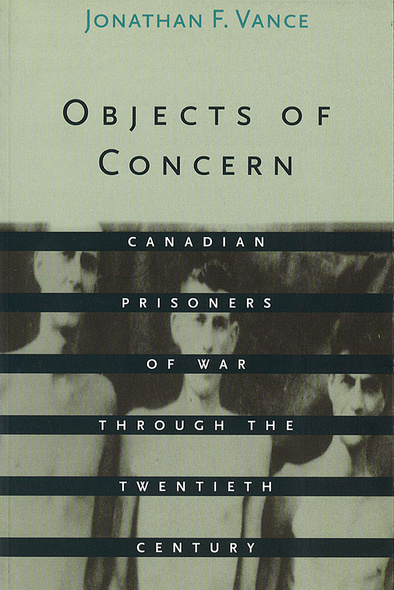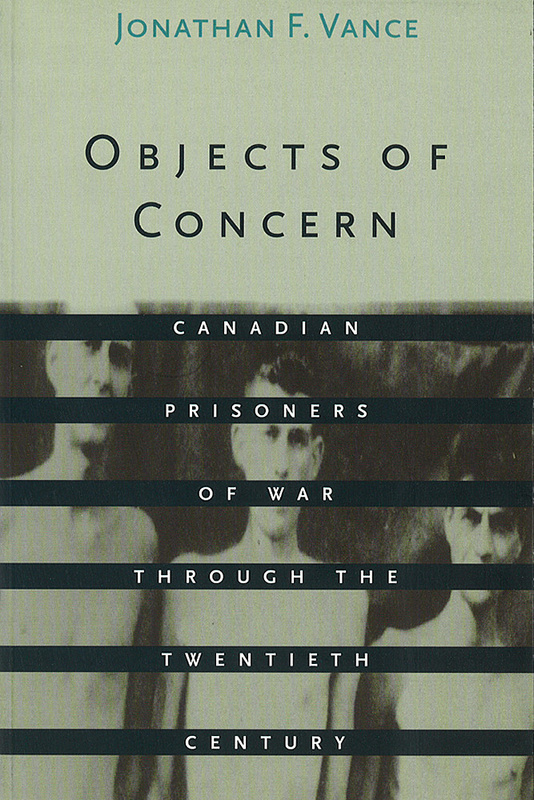
Objects of Concern
Canadian Prisoners of War Through the Twentieth Century
Hockey magnate Conn Smythe, Trudeau cabinet minister Gilles Lamontagne, and the composer and former conductor of the Toronto Symphony Orchestra, Sir Ernest MacMillan, share something other than their fame: they all have the dubious distinction of having been captured by the enemy during Canada’s wars of the twentieth century. Like some 15,000 other Canadians, Smythe, Lamontagne, and MacMillan experienced the bewilderment that accompanied the moment of capture, the humiliation of being completely in the captor’s power, and the sense of stagnating in a backwater while the rest of the world moved forward.
From prison camps in Eire, where POWs were allowed to keep pets and to be members of the local tennis clubs, to camps in Japan, where prisoners were often severely beaten, systematically starved, and overworked, Canadian prisoners of war throughout the twentieth century have faced a variety of conditions and experiences. But they did not fight their war alone and isolated. On the home front, many other people attempted to help them. Against the backdrop of the POW experience, Jonathan Vance provides the first comprehensive account of how the Canadian government and non-governmental organizations such as the Red Cross have dealt with the problems of prisoners of war.
Beginning in the nineteenth century, Vance traces the growth of Canadian interest in the plight of POWs. He goes on to examine the measures taken to assist Canadian POWs during the two world wars and the Korean war. The book focuses in particular on the campaigns to ship relief supplies to prison camps and on attempts to secure the prisoners’ release.
POWs have sometimes been seen as forgotten casualties whose privations were misunderstood during war and whose needs were neglected afterwards. This perception developed out of a tradition in POW memoirs which paid little attention to the efforts of politicians, civil servants, and individuals who devoted considerable time and energy to their cause. Vance argues that this impression is wrong and that, in fact, every effort was made to ameliorate conditions for men and women in captivity. In his book, he outlines the difficulties and confusion that arose from jurisdictional squabbling and lack of clear communication. Ironically, Vance concludes, obstacles were more often created by an overabundance of enthusiasm than by a lack of interest in the prisoners’ fate. Canada’s wartime bureaucracy, often praised by historians, is revealed as needlessly complex and, in many ways, hopelessly inefficient.
In Objects of Concern, Jonathan Vance examines Canada’s role in the formation of an important aspect of international law, traces the growth and activities of a number of national and local philanthropic agencies, and recounts the efforts of ex-prisoners to secure compensation for the long-term effects of captivity. In doing so, he reminds Canadians of an aspect of war that has often been overlooked in conventional military history.
A fascinating study focusing on an underexplored issue. Vance tells this tale in a comprehensive and entertaining fashion.
[Vance] is to be applauded for his painstaking research effort and careful choice of photographs, cartoons and artwork. Our understanding of the politics surrounding POWs during the Boer War, two World Wars and the Korean War is enhanced by the materials surveyed in this handsomely-presented publication, as is our knowledge of the applicable international laws, relief activities, escape techniques, repatriation, war crimes, reintegration into society, and the POW battle for better pensions.
Vance’s text provides an exhaustive and meticulous account of the individual experiences of Canadian POWs. Objects of Concern is a meaningful and valuable work, one that should be read not only by those interested in military history, but by those with an interest in the courage and spirit of Canada’s ex-POWs of the twentieth century.
Introduction
1 Nineteenth-Century Precursors
2 “Everybody's Business”
3 Repatriation and Liberation
4 The Interwar Years
5 The Organizational Framework, 1939-45
6 Relief and Release in the European Theatre
7 A Tougher Nut: Prisoners of the Japanese
8 “The Debris of Past Wars”
Conclusion
Appendix
Notes
Bibliography
Index





